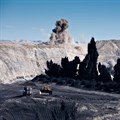The outlook for the recovery of our global economy is bleak. This is according to the World Economic Forum (WEF).

Source: iStock
It released the 17th Global Risk Report 2022 on Tuesday, which reveals the top risks facing humanity.
The report - compiled in collaboration with professional services firms Marsh McLennan, SK Group and Zurich Insurance Group - is underpinned by the Global Risks Perception Survey, which gathers insights from nearly 1000 global experts and leaders.
84 per cent of people who responded to the survey said that they were worried or concerned about the outlook of the world.
"Short term we're faced with global supply-chain challenges and huge inflationary pressure. And, due to the response to the Covid-19 crisis, there is a looming debt crisis in the world that reduces the fiscal ammunition going forward," said Børge Brende, WEF president.
Climate action failure of huge concern
Climate action failure was cited as the number one danger going forward. Significant erosion of social cohesion, livelihood crisis, climate action failure, concerns about mental-health deterioration and extreme weather have been the growing concerns since the outbreak of the pandemic.
"Covid 19 - with its economic and social consequences - continues to pose a critical threat to the world leaving long-lasting consequences on social cohesion. Furthemore, the global economy is expected to be 2.3 per cent smaller by 2024 than it would have been without the pandemic, said Peter Gige, Chief Risk Officer, Zurich Insurance.
"In the next 5 to 10 years, climate action failure and the environmental risk it brings - in the form of extreme weather events - will bring the most critical long-term effects to the world."
There are challenges, said Brende. "One is a lack of implementation on what was agreed upon at COP26 on capping global warming at 1.5 degrees Celsius and how we will reach Net Zero. The other risk is inequalities and social crisis.
"We have seen growing inequalities. How are we going to make sure that the social market economy is also using the necessary tools to address these challenges? If 3.6 billion people are not connected sufficiently to the Internet, how can we see leapfrogging? Here I believe that stakeholder capitalism companies taking on responsibility is important."
Saadia Zahid, WEF managing director agreed: "Now more than ever global leaders must come together and adopt a coordinated multi-stakeholder approach to tackle unrelenting global challenges and build resilience ahead of the next crisis."
Preparing for a net-zero transition
Zahid's call to action is all the more important - as a buffer against future disruption to economies and citizens - who will be impacted by the implementation of net-zero transition policies.
"Private sector should be as clear and concrete as possible when communicating their targets and their plan to go Net Zero by 2050, Marsh Continental Europe risk-management leader, Carolina Klink, said.
Net Zero means huge declines in the use of coal, oil and gas.
Gige reiterated that "Article 6 of the Paris agreement is the rulebook on carbon trading". "It will drive this transition, and the IFRS disclosure standards will help proof these standards.
"Economic drivers like a rapid increase in carbon price will have the greatest impact on consumers and businesses. Where innovation, incentives and policies fail to stimulate effective market solutions, there will be an increase [in carbon] costs. In carbon-intense industries - which employ millions of workers - this could trigger economic volatility, market disruptions and an increase in societal and geopolitical tensions," Gige said.
He warned that stalling of commitments could be a catalyst for increased economic instability.
"Any transition can be disruptive and disorderly, especially if there is greenwashing that could delay the transition. [Given these instances], there will be even more disruption, as even more radical policies will be required to achieve the net-zero transition goals."
Stakeholder buy-in
Fortunately governments, businesses and consumers are becoming increasingly focused on sustainability and climate change.
Marco Lambertini, Director General of WWF International, said: "The latest Global Risks Report from the World Economic Forum reveals that businesses and policy makers are finally waking up to the very real risks posed by both climate change and biodiversity loss."
"The latest Global Risks Report from the World Economic Forum reveals that businesses and policy makers are finally waking up to the very real risks posed by both climate change and biodiversity loss." - Marco Lambertini, WWF
"This is the result of a new eco-awakening. And it is why news headlines and social media are routinely dominated by stories about wildfires, droughts, extreme weather, scarcity of resources, loss of wildfire and of course, the ongoing global pandemic. As the world's leaders gear up for this year's biodiversity talks in China, it is critical that they act on society's concerns and finally connect the dots between climate change, the destruction of nature and our current production and consumption model."
Building resilience going forward
Brende said: "The question for businesses now is how they can position themselves for these transitions, as in any transition there will be winners and losers, and failure to adapt will lead to a loss of relevance."
Marsh Continental Europe risk-management leader, Carolina Klink said companies should no longer be reacting from a place of emergency, but rather be building resilience against future crises. She stressed that they should not only be looking at their assets, but also their vulnerabilities, and putting mitigation measures in place.
The biggest risk to businesses she said was aging technology, cyber attacks and identity theft.
"Due to the pandemic, companies have been under pressure to digitise and automate, but too often this is built on the backbone of aging technology. This has led to supply disruptions and cyber attacks, especially ransomware. 2021 saw the highest data breach in almost two decades, and cyber insurance pricing is going up; prices in the US rose by 96 percent in Q3 of 2021.
"Cyber attacks are not new. Their intensification over the last two years, however, means cyber threats are growing faster than our ability to prevent and manage them effectively.
"Companies won't be able to claim good Environmental, Social, and Governance (ESG) credentials without addressing these key areas," she said.
Waiting for government to lead with regulation, risks losing too much time for the innovation required of this time, Gige added.
"The transition to Net Zero will be as transformative as past Industrial Revolutions. To be timely and successful, this transition will need stakeholders to be determined, innovative and inclusive to protect the planet, economies and its people."


















